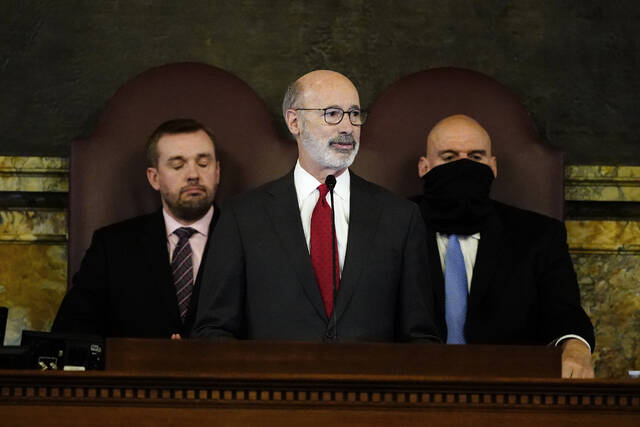Gov. Tom Wolf has given his last budget address.
In many ways, it played like a greatest hits album. His farewell concert included old standards that have defined his campaigns and budgets of the past — items like increasing the minimum wage and his signature song about increasing education funding. He pushed for a $2 billion shot in the arm for public schools and higher education and returned to his prior call for a minimum $45,000 teacher salary.
“Refusing to fund education equitably does not save us money. It just means we wind up spending more on social services, remedial programs, even prisons,” Wolf said.
If you were waiting for him to sing a few bars of severance taxes of gas drilling, you were going to be left wanting. He did, however, mention a 20% cut to corporate net income tax — something that should appeal to his Republican adversaries as well as boosting a sluggish pandemic economy.
There was plenty of math to focus on, with millions and billions tossed around like pennies in a fountain. That is nothing new at budget time, when big numbers are often thrown around, particularly at popular projects.
What was the more unexpected note was a conciliatory attitude toward the Republican- dominated Legislature.
Wolf acknowledged bipartisan opposition, even celebrating it as an important feature of the process and anticipating a final budget that looked much different than his outline. He spoke of the success the state has enjoyed when the executive and legislative branches worked to correct the retirement hole that had been dug by past administrations.
“Democrats and Republicans came together and decided that we were going to start paying our bill in full, even if that meant overhauling our system to bring it into line with reasonable employee retirement expectations,” he said.
There isn’t enough of that, he indicated, and he was correct. The future is for “coalition builders and consensus seekers,” he said, and he was right about that, too.
Too often during Wolf’s time in office — and the administrations that came before — the budget address was just the opening volley in at best a mutinous stalemate and at worst an ugly war with too great a chance of overshooting the June 30 deadline and resulting in no budget heading into the next fiscal year.
In a midterm year, a gubernatorial year and an election featuring one of the most hotly contested U.S. Senate campaigns in the nation, that cannot be allowed to happen in 2022. It is a particularly risky proposition as the parties are already at odds over redistricting and several prominent figures, including Senate President Pro Tempore Jake Corman, R-Centre, are vying for the governor’s job.
Wolf’s seemingly outstretched hand likely doesn’t matter. What it really comes down to is a cover of Billy Joel’s “We Didn’t Start the Fire.” Partisanship and budget battles didn’t begin with Wolf’s time in office, and it won’t end there either.








